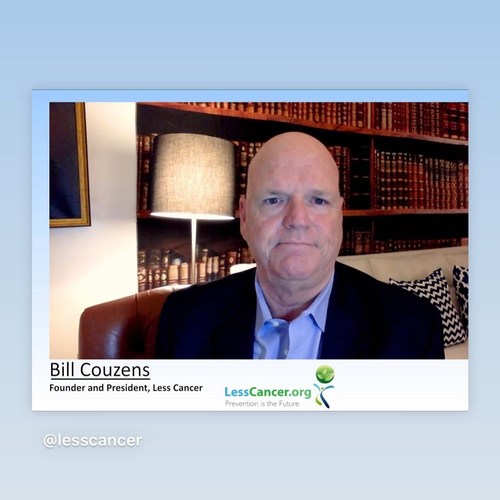FLAGS FLOWN AT US CAPITOL AND IN UTAH, VIRGINIA, MICHIGAN AND NEW HAMPSHIRE IN HONOR OF FEB. 4 NATIONAL CANCER PREVENTION DAY AND WORKSHOP
Feb. 2-4 National Cancer Prevention Workshop Features 70 Speakers
To mark National Cancer Prevention Day on Feb. 4, the National Cancer Prevention Workshop is welcoming more than 70 speakers for a virtual workshop viewed by students, legislators, physicians, nurse and public health professionals.
To mark the day, state flags were flown at the capitols of Utah, Virginia, Michigan and New Hampshire and at the U.S. Capitol.
Bill Couzens, founder and president, Less Cancer
"When we founded National Cancer Prevention Day in 2013, we had no way of envisioning how many would embrace it in this virtual format," said Less Cancer Founder Bill Couzens. "We now have participants from all over the world. It is an honor to have so many states raise a special flag to recognize our contribution to cancer prevention education."
Continuing education credits are provided for healthcare and public health professionals by the University of Virginia School of Medicine and School of Nursing and American University.
"The Town Council of Warrenton is proud to recognize and celebrate the dedicated and passionate work that Less Cancer is committing towards the prevention of cancer," said Warrenton, Virginia Mayor Carter Neville. "As policy makers, we are acutely aware that understanding and valuing the impact of how policy intersects with health is critical in our decision-making process. With the remarkable work provided by Less Cancer through symposia such as the National Cancer Prevention Workshops, we, along with all other governing bodies, continue to be best equipped to take proactive action to ensure that future generations can live with Less Cancer."
Less Cancer is headquartered in Warrenton, Virginia. For more information, visit www.lesscancer.org.
About Less Cancer
Founded in 2004, the Next Generation Choices Foundation is a 501(c)(3) public charity known more widely as "Less Cancer." The organization works to educate the public, create proactive public policies, and offer continuing education credit to physicians, nurses, and public health professionals regarding cancer, over 50 percent of which are preventable. Less Cancer signifies a new paradigm for addressing cancer, one focused on prevention. This is a departure from previous treatment-focused approaches, which focus on beating, conquering, or curing cancer.
































































































